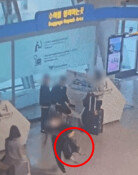Samsung Chairman Faces Dilemma in Independent Probe
Samsung Chairman Faces Dilemma in Independent Probe
Posted March. 17, 2008 08:31,
▽ Tax evasion in capital gains
The Samsung Group has said from the start of its slush fund scandal that its chairman Lee Kun-hee divided the property he inherited from his late father into bank accounts under different peoples names to invest in Samsung affiliates.
If this is the case, investigators say, Lee will face charges of tax evasion in capital gains.
If all of the accounts in question belong to Lee, all of their stock transactions must be recognized as those of major stakeholders. The transactions of listed stocks are not subject to capital gains tax, but major stakeholders must pay a tax of 20-30 percent of capital gains for all transactions.
Others say this is not tax evasion but a move for anti-takeover protection.
A legal expert said, Regardless of his intention, if it was tax evasion, he will be prosecuted for evading taxes.
▽ Punishment possible without further confession
Investigators have confirmed that Samsung has at least 1,300 bank accounts in other peoples names worth trillions of won.
Though only six executives have admitted to the existence of the accounts, investigators say they can confirm that all of the accounts belong to Lee without requiring a further confession. This is because of circumstantial evidence in which dozens of accounts have a simple PIN number such as 0000 or 1111.
In the past, Kim Hyun-chul, son of former President Kim Young-sam, and Chun Jae-yong, son of former President Chun Doo-hwan, went to prison for tax evasion.
One investigator said, We continue to check the accounts in other peoples names and their scope. We think that the amount of evaded taxes will keep increasing.
▽ Samsungs response
Samsung might say it divided the money in question into different accounts and invested in the stakes of its affiliates.
In that case, the executives at the groups strategic and planning office who were involved in the planning, creation and management of the slush funds will be subject to criminal prosecution. They also have to explain when they embezzled money from which company.
When an investigation delved into campaign money for the 2003 presidential election, Samsungs vice president Lee Hak-soo was held accountable for the chairmans involvement.
Samsung will apparently delay its decision for a while because of the following dilemma. If Lee admits to evading taxes, he faces criminal prosecution. But if he says he created slush funds with his companys money, his executives will be charged for embezzlement and breach of trust.
dnsp@donga.com verso@donga.com







